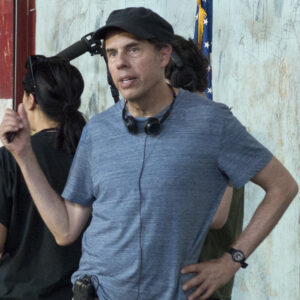A long-awaited follow up to Munch’s acclaimed 2011 Sundance film Letters From the Big Man, THE 11TH GREEN stars Campbell Scott (House of Cards,  Roger Dodger) as a journalist who uncovers the truth behind the mythology of President Eisenhower’s long-alleged involvement in extraterrestrial events. Rife with hidden government secrets and Matrix-like mind-benders, THE 11TH GREEN is grounded in what is widely believed to be the nuts-and-bolts core story of post-war U.S. military and government involvement with UFOs. In this way, the film sketches a possible backdrop to recent revelations in the mainstream media (eg, the New York Times and Washington Post) and subsequent declassification of certain U.S. military interactions with UFOs. Thought-provoking but understated, filled with sharply drawn characters, stark desert landscapes, and leaps across the space-time continuum, THE 11TH GREEN is challenging cinema that generates questions, discussion, and debate long after the credits roll. The film’s distinguished cast also includes Agnes Bruckner (Blood and Chocolate,
Roger Dodger) as a journalist who uncovers the truth behind the mythology of President Eisenhower’s long-alleged involvement in extraterrestrial events. Rife with hidden government secrets and Matrix-like mind-benders, THE 11TH GREEN is grounded in what is widely believed to be the nuts-and-bolts core story of post-war U.S. military and government involvement with UFOs. In this way, the film sketches a possible backdrop to recent revelations in the mainstream media (eg, the New York Times and Washington Post) and subsequent declassification of certain U.S. military interactions with UFOs. Thought-provoking but understated, filled with sharply drawn characters, stark desert landscapes, and leaps across the space-time continuum, THE 11TH GREEN is challenging cinema that generates questions, discussion, and debate long after the credits roll. The film’s distinguished cast also includes Agnes Bruckner (Blood and Chocolate,  Blue Car), Ian Hart (Harry Potter and the Sorcerer’s Stone, Backbeat), April Grace (Magnolia, Joker), Tom Stokes (The Railway Man, Wasted On the Young), David Clennon (Being There, The Thing), Monte Markham (Mr. Deed Goes to Town, Dallas), and Currie Graham (NYPD Blue, Project Blue Book). Groundbreaking American auteur Christopher Munch (director of The Sleepy Time Gal and the recently restored indie classic The Hours and Times) joins us to talk about his many-layered drama and the talented cast he assembled to breathe life into it.
Blue Car), Ian Hart (Harry Potter and the Sorcerer’s Stone, Backbeat), April Grace (Magnolia, Joker), Tom Stokes (The Railway Man, Wasted On the Young), David Clennon (Being There, The Thing), Monte Markham (Mr. Deed Goes to Town, Dallas), and Currie Graham (NYPD Blue, Project Blue Book). Groundbreaking American auteur Christopher Munch (director of The Sleepy Time Gal and the recently restored indie classic The Hours and Times) joins us to talk about his many-layered drama and the talented cast he assembled to breathe life into it.
Download MP3 Podcast | Open Player in New Window
For news and updates go to: christophermunch.com
To watch the film go to: theatricalathome.com/the-11th-green
About the filmmaker: Christopher Munch’s feature, the wilderness drama Letters from the Big Man (2011), was a New York Times Critics’ Pick and featured a lauded central performance by Lily Rabe. Five of his features have played at Sundance, and his first, The Hours and Times (1992), a speculative biopic about Beatles’ manager Brian Epstein, won a special jury prize there. An impossible dream was the overarching theme of Munch’s second feature, the period landscape drama Color of a Brisk and Leaping Day (1996), based on the true story of a young trolley mechanic who tries to save a doomed short-line railroad to Yosemite National Park. Munch then undertook the sprawling, unconventional mother-daughter story The Sleepy Time Gal (2002), which Kevin Thomas in the Los Angeles Times wrote “has a depth, range and subtlety far greater than most American films” and which David Ansen of Newsweek upon its release stated was Jacqueline Bisset’s “finest performance.” Munch followed this with another unconventional family dissection, Harry and Max (2004), about two pop star brothers. He is a past Guggenheim fellow, recipient of the Wolfgang Staudte Prize at Berlin, winner of two Independent Spirit Awards, including the “Someone To Watch” Award, and has been featured in two Whitney Biennial exhibitions. He has received competitive awards from the Alfred P. Sloan Foundation (for science in film), Creative Capital Foundation, The American Film Institute, The Merchant and Ivory Foundation, and others. christophermunch.com
“The bottom line: a thoughtful and compelling what-if starring a never-better Campbell Scott. . . . A bracing example of Munch’s fearless knack for casting a new light on official stories. . . . that information unwinds with a provocative and illuminating slant, and in combination with the film’s eccentric mix of genres, time periods and SoCal desert atmosphere, it makes for a heady revisionist saga. . . . For all the story’s machinations and dark doings, The 11th Green is concerned not with narrowly defined party politics but the power of cabals, and the relative powerlessness of figureheads. . . . [I]n its precision and poetry, the language is alive, and Munch gives each character a distinctive voice.” – Sheri Linden, The Hollywood Reporter
“Wildly inventive . . . a work of meticulous historical reimagination. . . . With tight-lipped restraint, Munch giddily tweaks the past seventy-five years of political assumptions and the very concept of life on Earth.” – Richard Brody, The New Yorker
